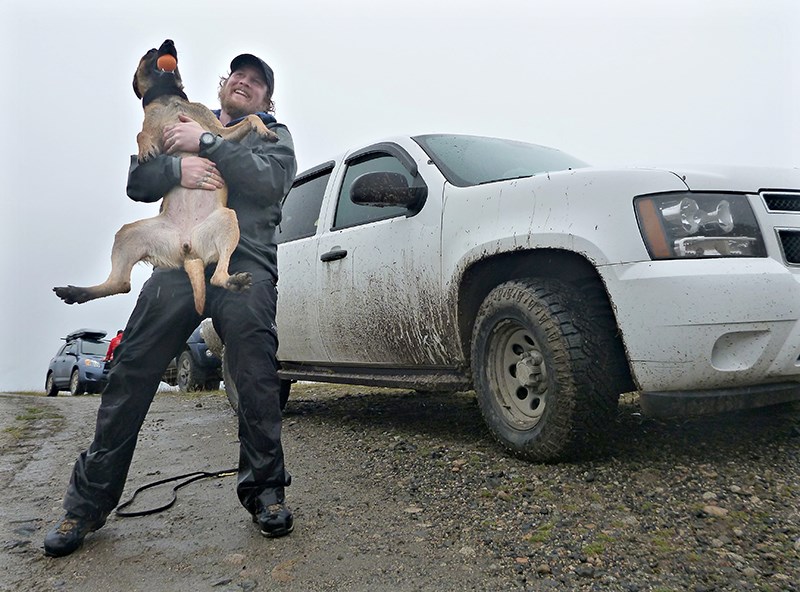Squamish’s Simon Hayter opens the crate in the back of his Chevrolet Tahoe and Ketchup, his dusty-brown Belgian Malinois, jumps down, vibrating with energy. The dog sniffs around the ground for a scent and quickly runs around the front of the truck and down to the driftwood at Nexen Beach.
“She is actually drugged right now, so that should give you an indication of what her normal temperament is,” Hayter says with a chuckle, explaining that two-and-a-half year old Ketchup has a sore paw so is on a sedative to keep her from further injuring herself.
“She’s very high energy, but she is also very, very friendly,” Hayter continues, as Ketchup runs back, a ball between her teeth, and nudges Hayter for attention. His other dog, Meat Sauce, sits patiently in his crate in the truck, watching Hayter intently.
Hayter and Ketchup are a newly certified search and rescue team, one of only two such teams with Squamish Search and Rescue.
The pair received their paperwork and validation certificate Sept. 26.
To be a working dog and handler team in search and rescue in B.C., teams have to be validated by the RCMP through tests that judge the dog’s search ability and obedience, Hayter explained.
Hayter and Ketchup are recognized by Emergency Management British Columbia on a list of teams to be called out for Squamish Search and Rescue, Lions Bay Search and Rescue and other neighbouring organizations, Hayter said.
Ketchup’s energy and keenness make her a good rescue dog, Hayter said.
To be validated, dogs need to be able to maintain a high-energy search for 90 minutes, and be independent enough to problem-solve and understand the concept of what they are looking for, he said.
The Malinois breed is known to be hardworking, intelligent and confident.
“They are popular with police and military services,” Hayter said.
Becoming a rescue dog is no easy feat, for the handler or the canine.
Meat Sauce was trained as a search and rescue dog but didn’t make the cut. Hayter adopted him anyway.
Hayter got Ketchup a year ago and it has been 24/7 training ever since, he said. Her name was actually Katya, but since his other dog is named Meat Sauce, Ketchup was a better fit, said Hayter.
She had some basic training when he got her from a specialized breeder in the U.S., then they worked together.
“It really is a full-on lifestyle,” he said. “We do exercises in the morning; we do a little bit of obedience. Maybe once or twice a week we do a practice search and I will lay out articles the night before and then send her to go in and find them.”
Hayter said a misconception people have, born perhaps from movies and TV shows, is that deployed search dogs are given an item from a missing person prior to a search.
“That is not true,” he said, adding the dogs are trained with articles previously worn by people and the dogs simply learn to search for a human scent.
The pair hasn’t been out on a search yet, but Hayter imagines he and Ketchup will be fairly busy in the corridor.
They have been validated by the umbrella organization British Columbia Search Dog Association and are currently working towards validation by the Canadian Avalanche Rescue Dogs Association, Hayter said.



